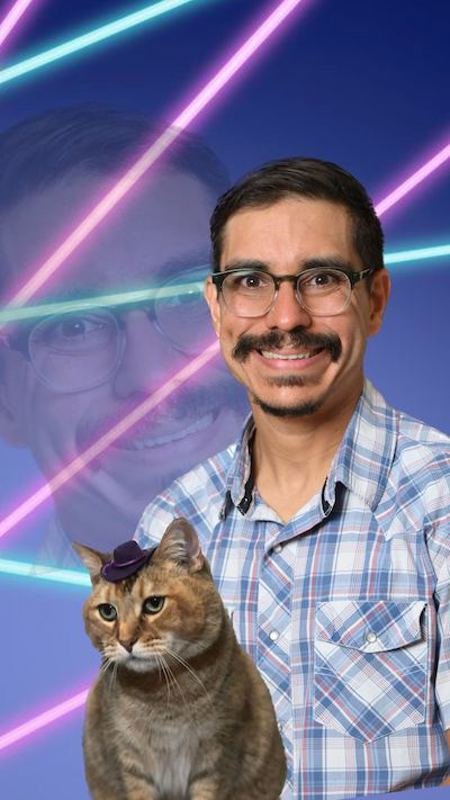Danny Caballero
Lappan, CREATE for STEM Institute
Lappan, Department of Computational Mathematics, Science and Engineering
Lappan, Department of Physics & Astronomy
Pronouns: he/they
Location: 1310 Biomed Phys Sci
Phone: 517-884-5657
Email: caball14@msu.edu
Website: https://dannycab.github.io
CV: Download CV
Bio
Marcos D. "Danny" Caballero is aProfessor in the Department of Physics and Astronomy and the Department of Computational Mathematics, Science and Engineering. He holds the Lappan-Phillips Chair of Physics Education, co-directs the Physics Education Research Lab, serves as a principal investigator for the Learning Machines Lab, conducts research as part of the newly-founded Computational Education Research Lab, and holds an appointment as research faculty at the University of Oslo’s Center for Computing in Science Education. Danny studies how tools and science practices affect student learning in physics and computational science, and the conditions and environments that support or inhibit this learning. Danny earned his B.S. in physics from the University of Texas at Austin in 2004. He worked on opto-microfluidics transport and control experiments at the Georgia Institute of Technology earning his M.S. in physics before shifting his research focus to physics education. He helped found the Georgia Tech Physics Education Research group in 2007 and earned the first physics education focused Ph.D. from Georgia Tech in 2011 working on computational modeling instruction and practice. Danny moved to the University of Colorado Boulder as a postdoctoral researcher and helped transform upper-division physics courses to more active learning environments. Danny conducts research from the high school to the upper-division and is particularly interested in how students learn through their use of tools such as mathematics and computing. His work employs cognitive and sociocultural theories of learning and aims to blend these perspectives to enhance physics and computational science instruction at all levels. His projects range from the fine-grained (e.g., how students engage with particular computational ideas) to the course-scale (e.g., what kind of computing students are able to do after instruction) to the very broad (e.g., how do departments value computation). His work includes the use of data science to address questions in STEM education.
Courses
- PHY 321: Classical Mechanics I
Selected Publications
- Aiken, J. M., De Bin, R., Hjorth-Jensen, M., & Caballero, M. D. (2020). Predicting time to graduation at a large enrollment American university. Plos one, 15(11), e0242334. View Publication
- Aiken, J. M., De Bin, R., Lewandowski, H. J., & Caballero, M. D. (2021). Framework for evaluating statistical models in physics education research. Physical Review Physics Education Research, 17(2), 020104. View Publication
- Caballero, M. D., & Merner, L. (2018). Prevalence and nature of computational instruction in undergraduate physics programs across the United States. Physical Review Physics Education Research, 14(2), 020129. View Publication
- Hamerski, P. C., McPadden, D., Caballero, M. D., & Irving, P. W. (2022). Students' perspectives on computational challenges in physics class. arXiv preprint arXiv:2202.07718. View Publication
- Mikkelsen, N. J., Young, N. T., & Caballero, M. D. (2021). Investigating institutional influence on graduate program admissions by modeling physics Graduate Record Examination cutoff scores. Physical Review Physics Education Research, 17(1), 010109. View Publication
- Odden, T. O. B., Lockwood, E., & Caballero, M. D. (2019). Physics computational literacy: An exploratory case study using computational essays. Physical Review Physics Education Research, 15(2), 020152. View Publication
- Wilson, J., Pollard, B., Aiken, J. M., Caballero, M. D., & Lewandowski, H. J. (2022). Classification of open-ended responses to a research-based assessment using natural language processing. Physical Review Physics Education Research, 18(1), 010141. View Publication
